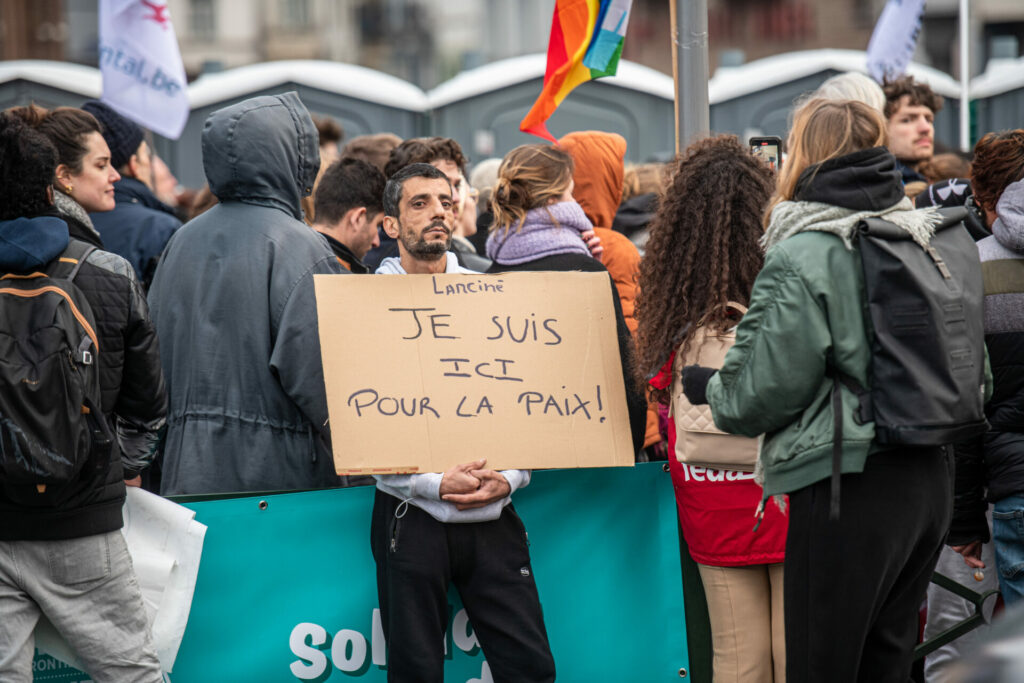The Brussels municipality of Molenbeek-Saint-Jean partially evacuated a reception centre housing hundreds of asylum seekers on Wednesday, despite the ongoing shortage of sheltered places.
The reception centre was set up temporarily to accommodate Ukrainian refugees and then housed 438 asylum seekers to cope with the lack of sheltered places in light of Belgium's reception crisis. On Wednesday, the local authorities suddenly launched a gradual and partial evacuation of the centre, which also housed many women and children.
"The police removed people from their rooms on one or two floors in the building. Some people were not in the centre at the time, and their rooms were blockaded so they can't enter anymore. Among those evicted was a woman with a young child. The situation is really dire," Lies Gilis, spokesperson for Fedasil, told The Brussels Times.
Fedasil has refused to cooperate with the eviction and has called the decision by Molenbeek's Mayor Cathérine Moureaux "inhumane" and "unprecedented."
She explained that the people were not evicted, but that they are waiting in the centre's dining hall. "We are looking to see what we can do now because we want to make sure they are given shelter tonight."
Bad timing
Gilis stressed that this will be a challenging task, as the reception crisis in the country is ongoing and there is a shortage of sheltered places. "So there is no immediate solution in sight, either," she said. "We don't have the option of putting them up somewhere else because we don't have any space."
This was mirrored by Nicole de Moor, Secretary of State for Asylum and Migration, who said the closure is particularly damning in light of the current crisis. She criticised the action, stressing that there have been few or no incidents at the centre in recent months.
"This is a centre that works well, so I do not understand why they would want to close it and evict more than 400 people who are being sheltered by Fedasil."
Ongoing perils
This feud between the Molenbeek municipality and Fedasil over the reception centre is nothing new. According to de Moor, collaboration with the local administration in Molenbeek had recently improved, especially during the evacuation operation at the Canal in March.
Moureaux, however, argued in a statement that she never gave her approval for the reception centre and that it was opened with "total disregard for Molenbeek's difficult socio-economic and financial situation." It was later greeted with opposition by the commune's residents who launched a petition that garnered over 850 signatures.
The mayor eventually challenged the decision in court, which ruled that Fedasil had to leave the building for urban planning reasons, resulting in it reapplying for planning permission in January.
Related News
- 'Stop the Reception Crisis' collective demand meeting with Federal Government
- 'Where is the action?': Politicians under fire for rights violations at EU's borders
This permission is still pending but the reception centre has remained open. "Molenbeek citizens cannot understand, let alone accept this," Moureaux wrote in the statement, which noted that Fedasil was informed of the eviction last week. The building is expected to be fully cleared by 13 June.
Moureaux, who argued that the municipality is already assisting many vulnerable people, explained that the authorities opted for a phased eviction to allow Fedasil to organise the resettlement of the people in its reception network. De Moor, meanwhile, said she remains open to dialogue with the local administration to find a solution for its continued existence.

